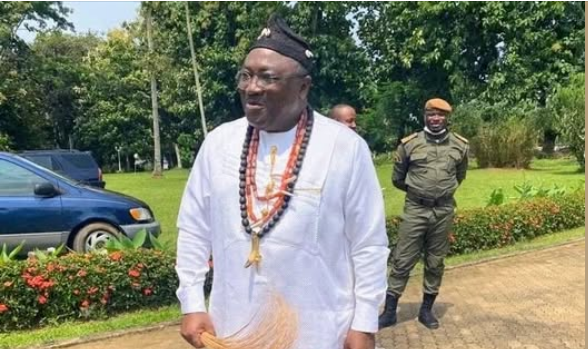Senator Nfon Mukete Issues Apology After Voter Intimidation Controversy
By James Agbor, BaretaNews
In a dramatic turn of events, Senator Nfon Mukete IV Ekoko, the CPDM campaign manager for the South West region, has issued a public apology from his palace in Kumba following widespread backlash over his earlier remarks that appeared to intimidate Cameroon Development Corporation (CDC) workers into voting for President Paul Biya. The traditional ruler’s statement comes after human rights lawyer Barrister Agbor Balla condemned Mukete’s initial comments as a “clear act of voter intimidation and a grave violation of democratic principles.”
In his new statement, Mukete sought to clarify his position, stating, “First and foremost, I recognize and fully respect the constitutional right of every Cameroonian citizen to vote according to their conscience, free from coercion or intimidation. Any words I may have expressed that appeared to suggest otherwise were unfortunate and do not reflect the spirit of unity, dignity, and democratic values that I have always sought to uphold.” He went on to acknowledge that the “phrasing and tone” of his remarks were “inappropriate” and offered his “sincere apologies” for the misstep.
The Senator’s earlier comments, which implied that CDC workers could face accusations of theft if they did not vote for Biya, were widely criticized for exploiting the recent payment of salary arrears owed to workers from 2018 to 2022—a move seen as a campaign tactic to bolster support for the incumbent, who is seeking an eighth term. Barrister Balla, the Buea-based founder of the Center for Human Rights and Democracy, had slammed Mukeke’s rhetoric as an assault on the democratic rights of Cameroonians, particularly CDC workers, to vote freely without fear or coercion.
Mukete’s apology appears to be an attempt to defuse the growing controversy, with the Senator claiming that his intention was “never to threaten or divide, but to encourage civic participation.” He further reaffirmed his “commitment to respecting the free will of all voters.” However, the sincerity of his apology is likely to be met with skepticism by many, given the gravity of his initial remarks and the broader context of the CPDM’s history of questionable electoral tactics.
While Mukete’s statement is a step toward accountability, it does little to erase the damage caused by his earlier words, which risked undermining public trust in the democratic process. The episode serves as a stark reminder of the need for political leaders to uphold the principles of free and fair elections, particularly in a region already grappling with tensions. Barrister Balla’s vocal condemnation has undoubtedly played a critical role in holding Mukete accountable, reinforcing the importance of vigilant advocacy in safeguarding Cameroonians’ democratic rights.
As the nation approaches a pivotal election, the spotlight remains on Senator Mukete and the CPDM to demonstrate that their commitment to democracy extends beyond words. For now, the people of the South West region—and indeed all Cameroonians—deserve leaders who respect their right to choose freely, without fear or manipulation.





